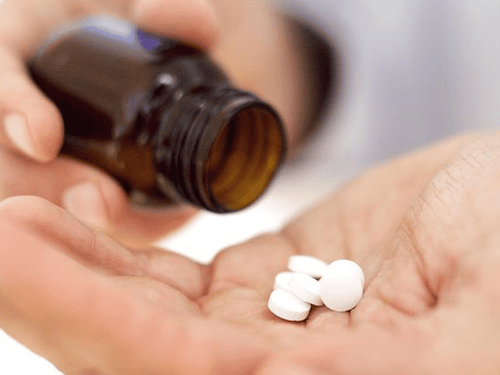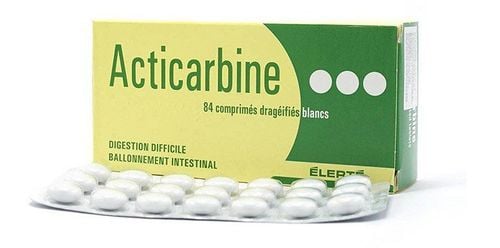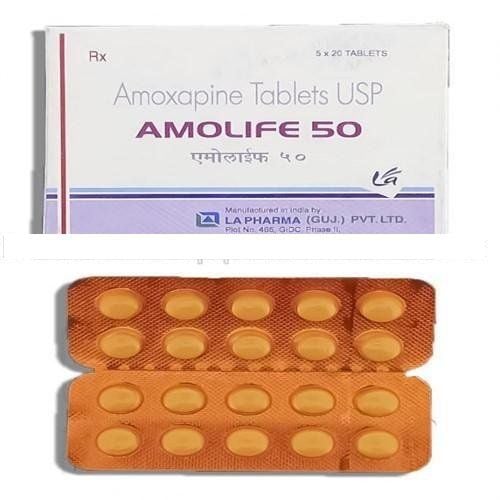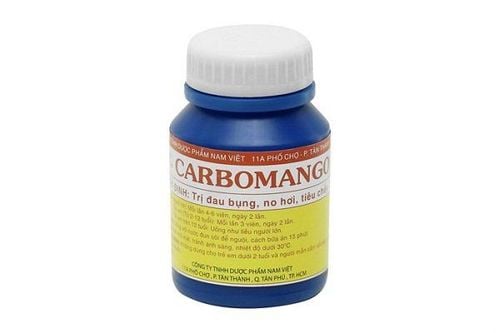This is an automatically translated article.
The article was professionally consulted with Doctor Vo Ha Bang Suong - General Internal Medicine - Department of Examination & Internal Medicine - Vinmec Phu Quoc International General Hospital.1. What is activated carbon?
Activated carbon is carbon that has been oxygen treated at a very high temperature to make it more porous. This method instead alters the internal structure, reducing the pore size and increasing the surface area.Activated charcoal is a black, odorless, tasteless powder that has been used since ancient times to treat various ailments.
Fine black powder obtained either sold whole or packaged as a supplement
Today it is most commonly used in medical settings to treat drug overdoses or as a remedy emergency anti-toxicity thanks to its effective adsorption effect on a variety of substances.
Activated carbon does not adsorb substances that are too small, have high ionization such as acids, alkalis, electrolytes (eg Potassium) and poorly adsorb easily dissociated salts such as Arsenic, bromide , cyanide, fluoride, iron, lithium, boric acid, ferric sulfate, ethanol and methanol.
Activated charcoal is also used medically with other therapeutic aids, but is less appreciated such as reducing bloating, lowering cholesterol levels and improving kidney function.
Activated carbon is also used as a number of additives such as helping to whiten teeth, filter water...
2. The mechanism of action of activated carbon
Activating coal by gas at high temperature causes the coal to develop microscopic pores, increasing the surface area. The porous texture of charcoal has a negative charge, attracting positively charged molecules, such as toxins and gases. When liquids or gases pass through this activated carbon, they bind to it through a process known as adsorption.The compound consisting of the activated carbon and the adsorbed substance is released through the gastrointestinal tract, reducing the risk of body poisoning because toxins are reduced (or not) absorbed into the body. Therefore, the early use of activated charcoal is very important in cases of poisoning, when the poison is still in the stomach, the effect is higher, if the poison has entered the intestines, the effect will be less.
Activated charcoal is also very effective in absorbing gas, helping to reduce bloating.
Activated charcoal is not absorbed from the gastrointestinal tract. Therefore, after taking activated charcoal will be eliminated through the digestive tract intact.
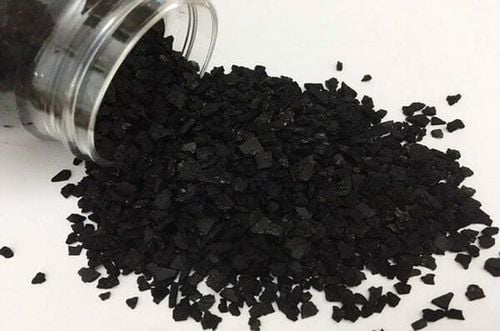
Than hoạt tính hoạt động như thế nào?
3. Benefits and uses of activated carbon
The prominent proven effect of activated charcoal is in the management of acute poisoning. Besides, activated charcoal also has a number of other benefits in treatment and in everyday household substances.3.1. Emergency Poison Handling Activated charcoal has been used as an emergency antitoxic treatment since the early 1800s. That's because it can bind to many drugs, reducing their effects.
Studies show that taking 50-100 grams of activated charcoal within 5 minutes of taking a medication can reduce an adult's ability to absorb that drug by up to 74%.
Activated charcoal is most effective when taken within the first hour after overdose or poisoning.
However, newer research reports some cases where it was effective even after this first hour. This may be because activated charcoal not only prevents a drug from being absorbed, but it also helps your body get rid of already absorbed drugs more quickly.
Furthermore, research shows that activated charcoal can be beneficial if taken up to 4 hours after taking slow-release medications, those that slow digestion, and large doses of medication.
In the emergency room, the starting dose is 50–100 grams. Depending on the specific assessment of each case, the patient's perception, the type of poisoning, the time of poisoning to have appropriate treatment. The patient is instructed to drink or via nasogastric tube if gastric lavage, the patient is not awake.
3.2. Aids in improving kidney function Human studies show that activated charcoal can help reduce blood levels of urea and other waste products, as well as improve kidney function in people with chronic kidney disease.
Activated charcoal can aid in improving kidney function by reducing the amount of waste your kidneys have to filter.
For chronic kidney disease, impaired kidney function is a decrease in the filtering capacity of the body, leading to the accumulation of toxins that need to be eliminated.
Activated charcoal can bind with urea and other toxins, helping the body get rid of them by binding to waste products in the intestinal lumen and passing through the digestive tract.
However, currently this treatment method is not widely applied in practice.
3.3. May reduce symptoms of “fish odor syndrome” Activated charcoal may help reduce unpleasant odors in people with trimethylaminuria (TMAU), also known as fish odor syndrome.
TMAU is an inherited condition in which trimethylamine (TMA), a compound that smells like rotten fish, builds up in the body.
Your body normally converts TMA to an odorless compound before it is excreted in the urine, but people with TMAU lack the enzyme needed to make this conversion. This causes TMA to build up and pass into urine, sweat, and breath, causing a fishy odor.
Studies show that the porous surface of activated carbon can bind with small, odorous compounds like TMA, increasing their excretion.
To improve fish odor syndrome, it is necessary to have a suitable diet, accompanied by drug treatment. The role of activated carbon is noted as supportive, not decisive.
3.4. May lower blood cholesterol levels Activated charcoal can help lower cholesterol levels by binding to cholesterol and cholesterol-containing bile acids in your intestines, preventing them from being absorbed. However, in practice, this method is rarely used to reduce blood cholesterol. A proper diet, exercise and specific drugs have proven effective in treating this disease
3.5. Used in support to relieve symptoms for some other diseases Reduce gas in the digestive tract. One study showed that taking activated charcoal reduces gas retention in the intestinal lumen. Support for cases of abdominal distension to reduce symptoms. This feature is also beneficial in cases where the abdominal ultrasound examination image is not clear due to gas. One small study found that taking activated charcoal 8 hours before an abdominal ultrasound significantly reduced the amount of gas in your intestines, helping you get a clearer ultrasound picture.
Support to reduce diarrhea symptoms. Efficacy has not been extensively studied and has not been considered a primary treatment. The principle of treatment is still to absorb the toxic substances causing diarrhea in the intestinal lumen, reducing symptoms.
3.6. Used as additive in household substances. Activated carbon is also used for other household and cosmetic purposes. However, most of these purported benefits are not scientifically proven.
Tooth whitening. This substance is said to have a whitening effect when used as a mouthwash or in toothpaste. It is thought to do so by absorbing plaque and other tooth-staining compounds. Skin Care. Applying this substance to the skin is said to treat acne, dandruff, and insect or snake bites. Pure water. Activated carbon can help purify water by removing contaminants, suspended solids, and microorganisms such as bacteria - all without affecting the pH or taste of the water.
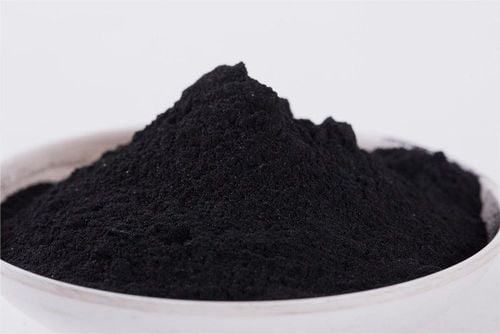
Than hoạt tính có thể giúp làm giảm lượng urê
4. Is activated carbon safe?
Activated charcoal is considered safe in most cases.Some possible side effects (not infrequent): vomiting, especially when used with sorbitol
In rare cases, activated charcoal has been associated with intestinal obstruction. May be encountered in some cases of patients accompanied by intestinal motility disorders, taking drugs to slow down intestinal motility according to the nervous mechanism...
Activated charcoal is also warned not to be used in these cases. Excluding hollow visceral perforation, gastrointestinal bleeding.
In cases of acute poisoning, the patient is not allowed to use it at home. Risk of aspiration into the respiratory tract. Especially the cases of hypertriglyceridemia are not awake. Moreover, patients with acute poisoning need to take other measures such as gastric lavage, electrolyte balance, respiratory and circulatory emergency and special drugs for each type of poisoning.
Although activated charcoal is considered quite safe to use, patients should not arbitrarily use it. Please consult your doctor before use.
5. Dosage
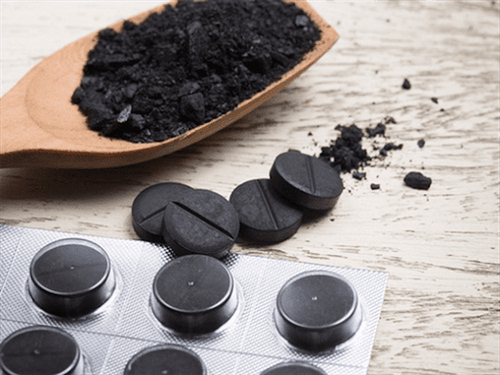
Than hoạt tính có thể giảm mỡ máu
Be sure to follow the dosage instructions on the label or use those in the studies mentioned above.
In case of drug poisoning, go to a medical facility immediately. Dosage depends on the specific situation of each case.
Adults: dose 2g/kg body weight, 20g activated charcoal every 2 hours, for toxic mushroom poisoning with amatoxin can take up to 3 days to cut the hepatobiliary cycle. Children: First dose 1 g/kg body weight, average 10 g activated charcoal, used as soon as possible after poisoning, (50% of adult dose). With powdered charcoal, always give the same dose of sorbitol as twice the dose of activated charcoal. Choose a dose interval of 2 or 4 hours depending on the amount of toxicity in the intestinal lumen and the patient's ability to tolerate activated charcoal. If the PATIENT is taking large doses of organophosphorus insecticides, the dose interval should be 2 hours for the first 6 doses. If there is decreased intestinal motility, the nasogastric tube should be saved and the stomach empty (including activated charcoal from the previous dose) before giving the next dose of activated charcoal. In other cases, dosing intervals should be 4-6 hours. Vinmec International General Hospital is one of the hospitals that not only ensures professional quality with a team of leading doctors, modern equipment and technology, but also stands out for its examination and consulting services. and comprehensive, professional medical treatment; civilized, polite, safe and sterile medical examination and treatment space. Customers when choosing to perform tests here can be completely assured of the accuracy of test results.
Please dial HOTLINE for more information or register for an appointment HERE. Download MyVinmec app to make appointments faster and to manage your bookings easily.
Articles refer to sources: healthline.com, medicalnewstoday.com, webmd.com




